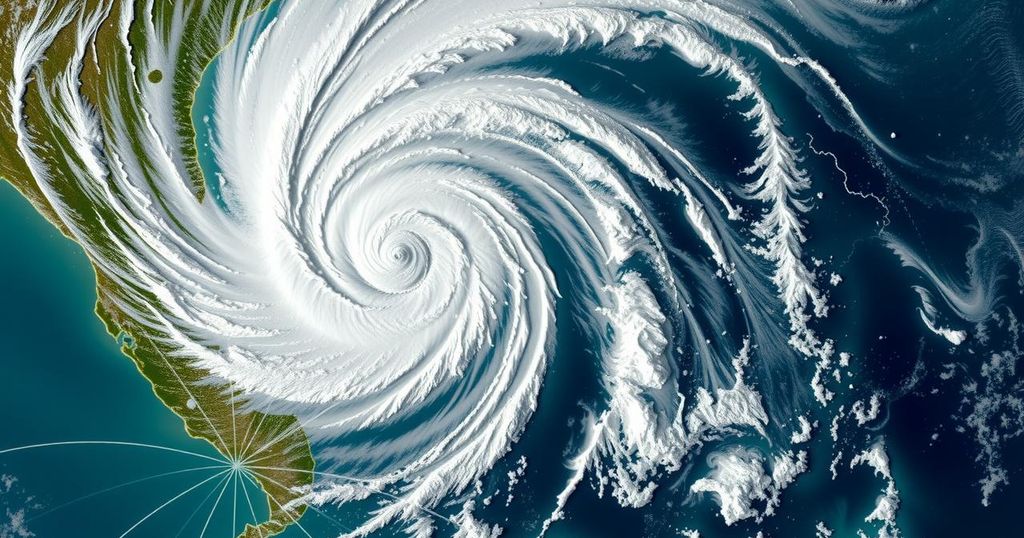Tropical Cyclone Chido: A Catastrophic Event in Mayotte and Its Wider Implications

Tropical Cyclone Chido has devastated Mayotte, causing severe destruction and a rising death toll, with whole neighborhoods wiped out. The U.S. faces critical decisions regarding environmental policies as the Trump administration prepares to take office, potentially reversing key clean energy initiatives. Globally, climate change intensifies extreme weather events, exemplified by multiple typhoons in the Philippines, highlighting an urgent need for proactive strategies to address these escalating challenges.
Tropical Cyclone Chido has ravaged the islands of Mayotte, a French territory situated in the Indian Ocean. This catastrophic event, classified as a Category 4 storm with wind speeds of 136 mph, marked the most powerful cyclone to strike the region in nearly a century. Reports indicate widespread devastation with entire neighborhoods obliterated and critical infrastructure utterly destroyed. Initial accounts confirm a death toll of 14, though this number is anticipated to increase significantly as search and recovery efforts continue. Local observers described the scene as apocalyptic, with one hotel owner likening it to the devastation of an atomic bomb. The cyclone disproportionately affected slum areas populated by thousands of undocumented migrants, deepening an already dire humanitarian crisis.
In parallel, the Biden administration is working to finalize significant environmental initiatives and finance agreements before transitioning power to the incoming Trump administration. Notable among these initiatives is the Energy Department’s Loan Programs Office, which currently has conditional commitments for substantial clean technology projects at risk of being revoked. As President-elect Trump’s team suggests a shift away from support for electric vehicles, including scrapping critical EV tax credits and emphasizing national defense funding, potential ramifications for climate policy loom large.
Meanwhile, global climate negotiations continue to face challenges, as evidenced by the recent UN COP16 summit’s failure to achieve a binding agreement on drought resilience funding for developing nations. Utah is also under scrutiny with two significant lawsuits poised to reshape environmental policy, including the regulation of hazardous crude oil shipment routes.
Further, research indicates that the recent typhoon season in the Philippines was exacerbated by climate change, with a historic six typhoons impacting the nation within November alone, leading to substantial loss of life and economic damage. Newly acquired data suggests an increasing intensity and frequency of storms, heightening the urgency of addressing climate-related disasters at all levels.
Collectively, these events highlight the pressing need for strategic action amidst an evolving climate landscape, where extreme weather events increasingly characterize our reality.
This article examines the recent devastation caused by Tropical Cyclone Chido in Mayotte, reflecting on the cyclonic intensity and the subsequent humanitarian crisis. It emphasizes the impacts of climatic events and their disproportionate effects on vulnerable populations. Additionally, the article explores the political climate in the U.S. concerning environmental policies as President-elect Trump prepares to assume office. Concurrently, it discusses the broader implications of climate change evidenced by severe weather across the globe, highlighting the interconnectedness of environmental, political, and economic factors. These issues underscore the urgent need for comprehensive climate action and equitable resource allocation in response to disasters exacerbated by climate change.
In summation, Tropical Cyclone Chido has inflicted unprecedented damage on Mayotte, showcasing the devastating consequences of climate change. As international negotiations struggle to address environmental concerns effectively, the U.S. faces a pivotal moment as it shifts from the Biden administration to Trump. The escalating instances of severe weather globally reflect a critical need for reformed climate action and collaboration to enhance resilience and mitigate future crises. The interconnectedness of these challenges necessitates urgent strategic responses at both national and international levels to safeguard vulnerable populations and manage environmental impacts.
Original Source: heatmap.news







